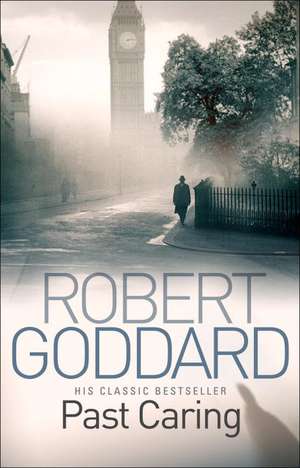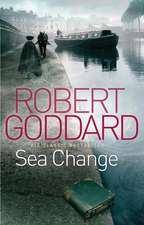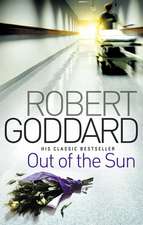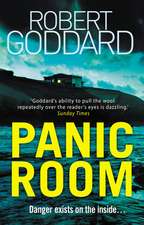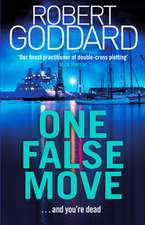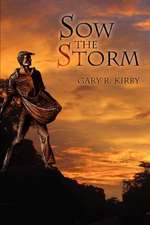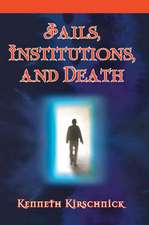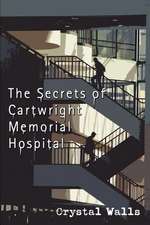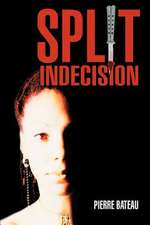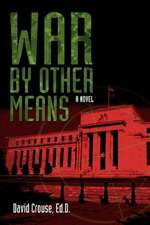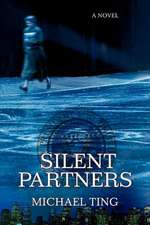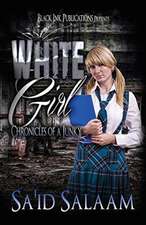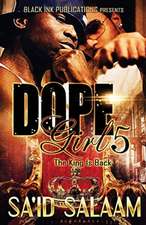Past Caring
Autor Robert Goddarden Limba Engleză Paperback – 29 sep 2010
| Toate formatele și edițiile | Preț | Express |
|---|---|---|
| Paperback (2) | 57.39 lei 22-33 zile | +26.19 lei 7-13 zile |
| Transworld Publishers Ltd – 29 sep 2010 | 57.39 lei 22-33 zile | +26.19 lei 7-13 zile |
| DELTA – 30 apr 2008 | 113.68 lei 6-8 săpt. |
Preț: 57.39 lei
Preț vechi: 65.88 lei
-13% Nou
Puncte Express: 86
Preț estimativ în valută:
10.98€ • 11.45$ • 9.13£
10.98€ • 11.45$ • 9.13£
Carte disponibilă
Livrare economică 28 februarie-11 martie
Livrare express 13-19 februarie pentru 36.18 lei
Preluare comenzi: 021 569.72.76
Specificații
ISBN-13: 9780552162951
ISBN-10: 0552162957
Pagini: 624
Dimensiuni: 129 x 198 x 35 mm
Greutate: 0.43 kg
Editura: Transworld Publishers Ltd
ISBN-10: 0552162957
Pagini: 624
Dimensiuni: 129 x 198 x 35 mm
Greutate: 0.43 kg
Editura: Transworld Publishers Ltd
Notă biografică
ROBERT GODDARD was born in Hampshire and read History at Cambridge. His first novel, Past Caring, was an instant bestseller. Since then his books have captivated readers worldwide with their edge-of-the-seat pace and their labyrinthine plotting. His first Harry Barnett novel, Into the Blue, was winner of the first WHSmith Thumping Good Read Award and was dramatized for TV, starring John Thaw.
Extras
Chapter One
The spring of 1977 found me, newly past thirty, a bad case of wasted talent in a largely waste city—an unemployed, divorced ex-schoolteacher of foundered promise and dismal prospect. London, that grey month of March, seemed to echo my self-pity.
That morning, the echo was a painful one in my head, fused with the dull ache of last night's beer and a well-worn theme being pursued by my increasingly reluctant host in the kitchen of his Greenwich house. It was Saturday, so the throb of traffic from Maze Hill was muted, the light, too, decently suffused as it struck the table where I sat, sipping strong black coffee. Jerry sat opposite me, washed and shaved, dressed and clear-headed just four things he was and I wasn't—scanning the shares pages of The Financial Times.
"Millennium up again," he said.
"They would be," I replied. The last thing I needed to know was that my former employer was continuing to prosper, but it didn't surprise me. Millennium Properties had always been astute in their purchase and promotion of historic buildings, but their only concession to scholarship was to hire over-qualified menials like me to fudge together their tour booklets.
Millennium had given me the first half-decent job I'd had since leaving teaching. But, in an unguarded moment at a Christmas party, I'd confided my contempt for their historical standards—which were as transatlantic as their parent company—to completely the wrong person. After that, it had just been a question of resigning before they could sack me.
I'd been in debt even before that and the loss of a salary soon meant the flat in Richmond had to go. That's when Jerry, a friend from schooldays, had offered me his spare room in Greenwich, to help me through a bad patch. But the patch had spread to two months and Jerry's patience was beginning to wear thin.
"Did I mention that Tribune are planning to open a new regional office in Crawley?"
He had. And he'd mentioned that they'd be recruiting staff as a result and that, if I was interested, he could put in a word. I was, in fact, monumentally uninterested. Jerry was an earnest, hard-working actuary for the Tribune Life Assurance Company, where he was doubtless highly thought of. But I could never thrive in his world and it wouldn't have done me—or Jerry—any good to try. Yet explaining that to him was supremely difficult. Not only would his sense of efficiency be affronted, but his over-serious, understated personality would fail to comprehend how Tribune Life—thirty-eight hours a week in modern offices with increments for the industrious and special rates for staff—could be ideal for him but anathema to me.
"Yes, you did. I'm looking out for the adverts when they start staffing it."
It was a lie, of course. I wasn't looking out for those or any other vacancies. My pretence was designed to appease Jerry and still my own secret fear that it wasn't so much insurance as any career that I couldn't face.
I seized on a distraction exercise: opening my morning mail. There were two letters, neatly propped by Jerry against the toast rack. One was a credit card statement. The other looked more promising: a Portuguese stamp and writing I recognized at once.
"This one's from Alec," I announced, hoping that his news from Madeira would take us off the questions of my unemployment and homelessness. Jerry only knew Alec Fowler through me and I only knew him because we'd shared a landing at university. He was one of those students sophisticated beyond their years who made the rest of us feel gauche and schoolboyish. But I was quick to learn and he was eager for company in his riotous life. Alec surrounded himself with those—such as me—who liked to regard themselves as free-thinking radicals. Cambridge in the late sixties was a forcing house for our self-indulgent brand of student chic which held that smoking pot and decrying established ideas was a new and important social development. With Alec's rogue intellect to guide us, it seemed credible. Ten years on, it appeared unbelievably naive and—which we would have hated more–irrelevant. Yet it retained a freshness and an optimism that marked it out in my mind from the years of disillusionment since.
While I had filled those years by acquiring, then losing, a wife, child and teaching career, and England had stumbled through oil price rises and three-day weeks, Alec had contrived always to enjoy himself. Questioned but not charged, warned but not sent down, over the Garden House riot, he had appeared to devote all his study time to political free-sheets but had still come out with a first in English and then, in his own words, drifted with purpose: Paris ("looking for the spirit of '68"), then Venice ("to see it before it sank") and Crete ("to teach English and study the Mediterranean light"). These spells away were punctuated by trips home, when he would descend on me to relive our student days in drunken weekends that were more than once the despair of my wife.
Alec's real ambition, as he often told me, was to break into journalism. This seemed always about to happen but never had yet. He was in New York at the time of Watergate but couldn't persuade anybody to print what he wrote on the subject. He was taken on by a Montreal evening paper at the time of the Olympics, but the job fell through before the Games even began. Then it was time to forget journalism for a while and repair his finances with a six-month teaching contract in Madeira.
Only he hadn't come back at Christmas as scheduled, just when his company would have been the tonic I badly needed. I'd written to him several times and this was his first reply. I read the letter aloud to Jerry, hoping it would take his mind off my job-seeking and flat-hunting efforts—or lack of them.
"Hi Martin,
"How are you? Sorry all's been quiet from me lately, but I've had a lot on—more of that in a moment. Sad to hear about Millennium, but you're probably well off out of it. Congratulations to Jerry for putting up with you for so long.
The teaching stopped at Christmas and you wanted to know what I've been doing since then. Never one to let the grass grow—no pun intended—I've started, wait for it, an island newspaper. Madeira's full of the English—in retirement or on holiday. My idea was to give them a monthly magazine: a glossy English language affair full of photographs of Madeira's natural beauty (which is considerable) and current affairs (which aren't), to tell the tourists what to see and where and the ex-pats about what's going on. I had a head start because there was simply no competition. What's more, there's a friend of mine here who's as good a photographer as I am a journalist (fatal combination?) and came in with me, plus lots of shops and businesses keen to advertize to the English, who are their best customers.
There's also a South African hotelier in Funchal who put up the money to start us off. Madeira Life was launched last month and so far (fingers crossed) it's going well. Leo—the hotelier—arranged a cocktail do to butter up all the right people. I tell you, if this goes on there's some danger of me becoming an establishment figure. More to the point, it could pave my way into Fleet Street.
But not for a while yet. I'll have to do my apprenticeship here first. Which brings me to an idea I've had to brighten your life. Why not drop whatever you're doing—which is nothing much according to your last letter—and come out here for a holiday? The Portuguese couple I share this house with are away for the next month so I can easily put you up. Madeira's beautiful in the spring. I could show you round, you could tell me what you think of the magazine and we could talk about old times.
What do you think? Let me know soon, Cheers, Alec."
"Will you go?" said Jerry, a little too quickly for my liking.
"If I can possibly manage it, I'll be there like a shot." I was more confident than I might have sounded. I had a few hundred in a building society to cater for emergencies and this could definitely be classified as one.
"Well, why not?" said Jerry. "A holiday would do you good."
By Monday night, I was able to telephone Alec to suggest a date. After several false starts and through a forest of static, I heard his familiar voice down the cable from distant Madeira.
"Glad you can make it, Martin. It'll be great to see you."
"Hope so, but it's sooner than you might have expected. I've got an option on a spare seat aboard a charter flight on the 31st."
"Take it. That'll be a good time—I'll be between issues and able to show you the sights. And the sooner you come the better—it may be worth your while."
I dictated the flight number and time to him before we gave up the struggle with the static. Only after I'd put the phone down did I reflect on what he'd said and wonder whether he meant the trip might be worth more than just a holiday. Now the magazine was taking off, did he have something to offer to an old friend's advantage? It was no more than the glimmer of a pleasing suspicion, but it carried me happily through the week before my departure.
***
It was in a mood of well-being and optimism that I boarded the charter flight to Madeira. Amid the holiday-bound happy families, I felt out of place, but a few in-flight drinks passed the time well enough, until, that is, stormy weather began to jostle the aircraft.
As we buffeted down towards Madeira, I peered out of the window for a sight of it, my knuckles on the arm of the seat turning as white as the wavetops which I found myself taking all too close a look at. There was, though, a smudge of green somewhere ahead of us and soon we hit something I hoped was the runway and braked violently to a halt. I stumbled from the aircraft instantly sober, tugging on an anorak against the drenching rain and trailing behind the others into the terminal building.
There was no sign of Alec as we cleared customs and the rest of the passengers began to disperse, but just when I was beginning to fret, I saw him bounding down some steps from an upper floor of the building.
"Hi, Martin," he called, strolling towards me with a casual wave of greeting. He looked fit and well, tanned and relaxed, sandy hair turned blond by the sun, more like a lifeguard than a journalist as he clapped me on the back and smiled broadly.
"How are you, old son? You look bloody awful."
"Thanks, Alec." I grinned ruefully. "So would you if you'd been through that landing. I thought we were going to ditch in the Atlantic."
"A bit hairy, eh? It didn't look too bad from the bar."
"What does?"
"That's more like it. Actually, the runway is a bit on the short side. I didn't tell you because I thought it might put you off. This weather doesn't help. You must have brought it with you—it's the worst day of the year. Trust a pessimist like you to arrive when Madeira's looking at its worst." Alec was right: I'd always expected the worst from life and generally got it. He'd always hoped for the best and sometimes been rewarded. That's why I'd spent an idle winter in London and he'd exploited the potential of an island in the sun. He was also right that it wasn't at its best that day. The taxi driver wore sunglasses and drove as if the roads were dry, but all I saw as we sped round hairpin bends along the coast road to Funchal were dark cliffs, angry seas and louring clouds—more like Cornwall than the tropics.
"Don't worry," Alec assured me, "weather like this never lasts. Madeira's a beautiful island, believe it or not. Not that the Madeirans do much to keep it that way." He pointed through the stair-rod rain at an abandoned building site. "They've got all the Latin vices"—we lurched through a pothole and I nodded agreement, while hoping the driver didn't understand English—"and only one virtue: they're letting me get a magazine on the road. I know it's the back of beyond, but it's a start." After countless false starts, Alec's hope was intact. And so, miraculously, were we when the taxi wound down the hills and bends into Funchal: a smear of grey and brown buildings round a semi-circle of hills above a broad bay.
Alec's house was a haven—cool, dry and peaceful, three things it hadn't been outside. I slumped down in the lounge with relief, while Alec kept up his scatter-gun appraisal of life on Madeira from the kitchen.
"It'll be black coffee," he shouted. "Milk's like gold dust here. But you look as if you need it straight anyway. There's a copy of the magazine on the table. Take a look."
Madeira Life, April 1977: bold lettering on a glossy cover, adorned by a smiling, dark-haired girl in a striped dress and bolero jacket, clasping bunches of mimosa, their bright yellow blooms starting from the page.
I leafed through the issue. Clever and perceptive pictures, and Alec's punchy prose, drew me on through a diary of events and a page of local news.
"What is the big story on Madeira at the moment, Alec?"
"There's never a big story, Martin. I just dress up what there is and pander to my readers' prejudices."
"And they are?"
"Predictable. The same as English exiles anywhere, I guess: Why are the locals so loud and lazy?"
"And where can you get a cheap dinner?"
"You've seen my piece on the Jardim de Sol. Actually it's a very good restaurant. I force myself to eat out every week to safeguard my readers' palates. Funchal's full of good, cheap eating places—and some bad ones. It's important to know the difference."
"I can imagine. Ah, this looks like your knowing eye."
I'd passed a centre spread on the Flower Festival and come to an array of darkly promising, thickly encrusted wine bottles: " 'Old Madeira—Does Any Still Remain?' "
"You're bound to become a connoisseur of the stuff here. The trade's dominated by the English families—always has been—so it's a natural subject for them to read about."
"And for you to sample on their behalf?"
"You said it. But that piece is about 1792 vintage and whether there mightn't be a few stray bottles left. Napoleon was offered some on his way to St. Helena but wasn't fit enough to drink any."
"Sad."
"Yes—but typical. Madeira's out of the main stream of world events. Famous people only come here before—or after—their prime. As you'll see."
I thought I already had, for here were sepia prints of Churchill, his unmistakable, bulky frame perched on a stool painting a seascape and, in another shot, posing with his wife on some arabesque balcony, with palm trees in the background.
The spring of 1977 found me, newly past thirty, a bad case of wasted talent in a largely waste city—an unemployed, divorced ex-schoolteacher of foundered promise and dismal prospect. London, that grey month of March, seemed to echo my self-pity.
That morning, the echo was a painful one in my head, fused with the dull ache of last night's beer and a well-worn theme being pursued by my increasingly reluctant host in the kitchen of his Greenwich house. It was Saturday, so the throb of traffic from Maze Hill was muted, the light, too, decently suffused as it struck the table where I sat, sipping strong black coffee. Jerry sat opposite me, washed and shaved, dressed and clear-headed just four things he was and I wasn't—scanning the shares pages of The Financial Times.
"Millennium up again," he said.
"They would be," I replied. The last thing I needed to know was that my former employer was continuing to prosper, but it didn't surprise me. Millennium Properties had always been astute in their purchase and promotion of historic buildings, but their only concession to scholarship was to hire over-qualified menials like me to fudge together their tour booklets.
Millennium had given me the first half-decent job I'd had since leaving teaching. But, in an unguarded moment at a Christmas party, I'd confided my contempt for their historical standards—which were as transatlantic as their parent company—to completely the wrong person. After that, it had just been a question of resigning before they could sack me.
I'd been in debt even before that and the loss of a salary soon meant the flat in Richmond had to go. That's when Jerry, a friend from schooldays, had offered me his spare room in Greenwich, to help me through a bad patch. But the patch had spread to two months and Jerry's patience was beginning to wear thin.
"Did I mention that Tribune are planning to open a new regional office in Crawley?"
He had. And he'd mentioned that they'd be recruiting staff as a result and that, if I was interested, he could put in a word. I was, in fact, monumentally uninterested. Jerry was an earnest, hard-working actuary for the Tribune Life Assurance Company, where he was doubtless highly thought of. But I could never thrive in his world and it wouldn't have done me—or Jerry—any good to try. Yet explaining that to him was supremely difficult. Not only would his sense of efficiency be affronted, but his over-serious, understated personality would fail to comprehend how Tribune Life—thirty-eight hours a week in modern offices with increments for the industrious and special rates for staff—could be ideal for him but anathema to me.
"Yes, you did. I'm looking out for the adverts when they start staffing it."
It was a lie, of course. I wasn't looking out for those or any other vacancies. My pretence was designed to appease Jerry and still my own secret fear that it wasn't so much insurance as any career that I couldn't face.
I seized on a distraction exercise: opening my morning mail. There were two letters, neatly propped by Jerry against the toast rack. One was a credit card statement. The other looked more promising: a Portuguese stamp and writing I recognized at once.
"This one's from Alec," I announced, hoping that his news from Madeira would take us off the questions of my unemployment and homelessness. Jerry only knew Alec Fowler through me and I only knew him because we'd shared a landing at university. He was one of those students sophisticated beyond their years who made the rest of us feel gauche and schoolboyish. But I was quick to learn and he was eager for company in his riotous life. Alec surrounded himself with those—such as me—who liked to regard themselves as free-thinking radicals. Cambridge in the late sixties was a forcing house for our self-indulgent brand of student chic which held that smoking pot and decrying established ideas was a new and important social development. With Alec's rogue intellect to guide us, it seemed credible. Ten years on, it appeared unbelievably naive and—which we would have hated more–irrelevant. Yet it retained a freshness and an optimism that marked it out in my mind from the years of disillusionment since.
While I had filled those years by acquiring, then losing, a wife, child and teaching career, and England had stumbled through oil price rises and three-day weeks, Alec had contrived always to enjoy himself. Questioned but not charged, warned but not sent down, over the Garden House riot, he had appeared to devote all his study time to political free-sheets but had still come out with a first in English and then, in his own words, drifted with purpose: Paris ("looking for the spirit of '68"), then Venice ("to see it before it sank") and Crete ("to teach English and study the Mediterranean light"). These spells away were punctuated by trips home, when he would descend on me to relive our student days in drunken weekends that were more than once the despair of my wife.
Alec's real ambition, as he often told me, was to break into journalism. This seemed always about to happen but never had yet. He was in New York at the time of Watergate but couldn't persuade anybody to print what he wrote on the subject. He was taken on by a Montreal evening paper at the time of the Olympics, but the job fell through before the Games even began. Then it was time to forget journalism for a while and repair his finances with a six-month teaching contract in Madeira.
Only he hadn't come back at Christmas as scheduled, just when his company would have been the tonic I badly needed. I'd written to him several times and this was his first reply. I read the letter aloud to Jerry, hoping it would take his mind off my job-seeking and flat-hunting efforts—or lack of them.
"Hi Martin,
"How are you? Sorry all's been quiet from me lately, but I've had a lot on—more of that in a moment. Sad to hear about Millennium, but you're probably well off out of it. Congratulations to Jerry for putting up with you for so long.
The teaching stopped at Christmas and you wanted to know what I've been doing since then. Never one to let the grass grow—no pun intended—I've started, wait for it, an island newspaper. Madeira's full of the English—in retirement or on holiday. My idea was to give them a monthly magazine: a glossy English language affair full of photographs of Madeira's natural beauty (which is considerable) and current affairs (which aren't), to tell the tourists what to see and where and the ex-pats about what's going on. I had a head start because there was simply no competition. What's more, there's a friend of mine here who's as good a photographer as I am a journalist (fatal combination?) and came in with me, plus lots of shops and businesses keen to advertize to the English, who are their best customers.
There's also a South African hotelier in Funchal who put up the money to start us off. Madeira Life was launched last month and so far (fingers crossed) it's going well. Leo—the hotelier—arranged a cocktail do to butter up all the right people. I tell you, if this goes on there's some danger of me becoming an establishment figure. More to the point, it could pave my way into Fleet Street.
But not for a while yet. I'll have to do my apprenticeship here first. Which brings me to an idea I've had to brighten your life. Why not drop whatever you're doing—which is nothing much according to your last letter—and come out here for a holiday? The Portuguese couple I share this house with are away for the next month so I can easily put you up. Madeira's beautiful in the spring. I could show you round, you could tell me what you think of the magazine and we could talk about old times.
What do you think? Let me know soon, Cheers, Alec."
"Will you go?" said Jerry, a little too quickly for my liking.
"If I can possibly manage it, I'll be there like a shot." I was more confident than I might have sounded. I had a few hundred in a building society to cater for emergencies and this could definitely be classified as one.
"Well, why not?" said Jerry. "A holiday would do you good."
By Monday night, I was able to telephone Alec to suggest a date. After several false starts and through a forest of static, I heard his familiar voice down the cable from distant Madeira.
"Glad you can make it, Martin. It'll be great to see you."
"Hope so, but it's sooner than you might have expected. I've got an option on a spare seat aboard a charter flight on the 31st."
"Take it. That'll be a good time—I'll be between issues and able to show you the sights. And the sooner you come the better—it may be worth your while."
I dictated the flight number and time to him before we gave up the struggle with the static. Only after I'd put the phone down did I reflect on what he'd said and wonder whether he meant the trip might be worth more than just a holiday. Now the magazine was taking off, did he have something to offer to an old friend's advantage? It was no more than the glimmer of a pleasing suspicion, but it carried me happily through the week before my departure.
***
It was in a mood of well-being and optimism that I boarded the charter flight to Madeira. Amid the holiday-bound happy families, I felt out of place, but a few in-flight drinks passed the time well enough, until, that is, stormy weather began to jostle the aircraft.
As we buffeted down towards Madeira, I peered out of the window for a sight of it, my knuckles on the arm of the seat turning as white as the wavetops which I found myself taking all too close a look at. There was, though, a smudge of green somewhere ahead of us and soon we hit something I hoped was the runway and braked violently to a halt. I stumbled from the aircraft instantly sober, tugging on an anorak against the drenching rain and trailing behind the others into the terminal building.
There was no sign of Alec as we cleared customs and the rest of the passengers began to disperse, but just when I was beginning to fret, I saw him bounding down some steps from an upper floor of the building.
"Hi, Martin," he called, strolling towards me with a casual wave of greeting. He looked fit and well, tanned and relaxed, sandy hair turned blond by the sun, more like a lifeguard than a journalist as he clapped me on the back and smiled broadly.
"How are you, old son? You look bloody awful."
"Thanks, Alec." I grinned ruefully. "So would you if you'd been through that landing. I thought we were going to ditch in the Atlantic."
"A bit hairy, eh? It didn't look too bad from the bar."
"What does?"
"That's more like it. Actually, the runway is a bit on the short side. I didn't tell you because I thought it might put you off. This weather doesn't help. You must have brought it with you—it's the worst day of the year. Trust a pessimist like you to arrive when Madeira's looking at its worst." Alec was right: I'd always expected the worst from life and generally got it. He'd always hoped for the best and sometimes been rewarded. That's why I'd spent an idle winter in London and he'd exploited the potential of an island in the sun. He was also right that it wasn't at its best that day. The taxi driver wore sunglasses and drove as if the roads were dry, but all I saw as we sped round hairpin bends along the coast road to Funchal were dark cliffs, angry seas and louring clouds—more like Cornwall than the tropics.
"Don't worry," Alec assured me, "weather like this never lasts. Madeira's a beautiful island, believe it or not. Not that the Madeirans do much to keep it that way." He pointed through the stair-rod rain at an abandoned building site. "They've got all the Latin vices"—we lurched through a pothole and I nodded agreement, while hoping the driver didn't understand English—"and only one virtue: they're letting me get a magazine on the road. I know it's the back of beyond, but it's a start." After countless false starts, Alec's hope was intact. And so, miraculously, were we when the taxi wound down the hills and bends into Funchal: a smear of grey and brown buildings round a semi-circle of hills above a broad bay.
Alec's house was a haven—cool, dry and peaceful, three things it hadn't been outside. I slumped down in the lounge with relief, while Alec kept up his scatter-gun appraisal of life on Madeira from the kitchen.
"It'll be black coffee," he shouted. "Milk's like gold dust here. But you look as if you need it straight anyway. There's a copy of the magazine on the table. Take a look."
Madeira Life, April 1977: bold lettering on a glossy cover, adorned by a smiling, dark-haired girl in a striped dress and bolero jacket, clasping bunches of mimosa, their bright yellow blooms starting from the page.
I leafed through the issue. Clever and perceptive pictures, and Alec's punchy prose, drew me on through a diary of events and a page of local news.
"What is the big story on Madeira at the moment, Alec?"
"There's never a big story, Martin. I just dress up what there is and pander to my readers' prejudices."
"And they are?"
"Predictable. The same as English exiles anywhere, I guess: Why are the locals so loud and lazy?"
"And where can you get a cheap dinner?"
"You've seen my piece on the Jardim de Sol. Actually it's a very good restaurant. I force myself to eat out every week to safeguard my readers' palates. Funchal's full of good, cheap eating places—and some bad ones. It's important to know the difference."
"I can imagine. Ah, this looks like your knowing eye."
I'd passed a centre spread on the Flower Festival and come to an array of darkly promising, thickly encrusted wine bottles: " 'Old Madeira—Does Any Still Remain?' "
"You're bound to become a connoisseur of the stuff here. The trade's dominated by the English families—always has been—so it's a natural subject for them to read about."
"And for you to sample on their behalf?"
"You said it. But that piece is about 1792 vintage and whether there mightn't be a few stray bottles left. Napoleon was offered some on his way to St. Helena but wasn't fit enough to drink any."
"Sad."
"Yes—but typical. Madeira's out of the main stream of world events. Famous people only come here before—or after—their prime. As you'll see."
I thought I already had, for here were sepia prints of Churchill, his unmistakable, bulky frame perched on a stool painting a seascape and, in another shot, posing with his wife on some arabesque balcony, with palm trees in the background.
Recenzii
“A wonderful read…the satisfying climax weaves together the strands of past and present.…A poised telling of a complex tale.” —Publishers Weekly
"Combines the expert suspense manipulation skills of a Daphne DuMaurier romance with those of a John Le Carre thriller."—New York Times
"One of the best novel I've read in a long time...I loved every one of its 500 pages"—Washington Post
"A hornet's nest of jealousy, blackmail and violence. Engrossing"—Daily Mail
"A complex trail of blackmail and murder. Recommended"—Daily Express
"Combines the expert suspense manipulation skills of a Daphne DuMaurier romance with those of a John Le Carre thriller."—New York Times
"One of the best novel I've read in a long time...I loved every one of its 500 pages"—Washington Post
"A hornet's nest of jealousy, blackmail and violence. Engrossing"—Daily Mail
"A complex trail of blackmail and murder. Recommended"—Daily Express
